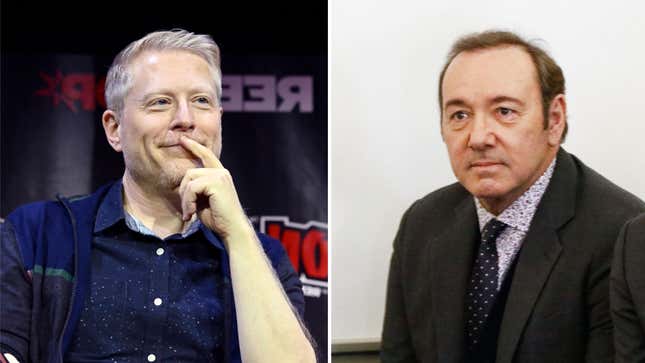Kevin Spacey’s Lawyer Asks Why Accuser Gave Sexual Assault Story to Buzzfeed, ‘Known for Lists and Quizzes’
Anthony Rapp called Spacey's assault when he was 14 the "most traumatic single event" of his life. This week, prosecutors spent hours trying to discredit him.
JusticePolitics

Three infamous sexual predators, Hollywood producer Harvey Weinstein, That ‘70s Show actor Danny Masterson, and House of Cards star Kevin Spacey, are currently in the throes of long-awaited trials. The cross-examination of Spacey’s accuser began this week, and, as to be expected, Spacey’s attorneys did their damndest to discredit him—including asking why he approached Buzzfeed with his allegations instead of a more prestigious outlet like the New York Times.
For the sake of context: Actor Anthony Rapp is suing Spacey for psychological damages incurred from an incident that occurred at a New York City house party in 1986. Rapp claims he was groped by a 26-year-old Spacey when he was just 14. According to last week’s emotional testimony from Rapp, Spacey invited the teenager to a party at his house when they were both performing in respective Broadway shows. Upon arriving at the party, Rapp says he became uncomfortable because he was really young and didn’t know anyone, so he went into a room to watch TV by himself. Then Spacey, who was allegedly “uneasy on his feet” and visibly intoxicated, came and found him, grabbed his butt, and lifted him onto the bed. Rapp says he was forced to “wriggle out” as Spacey “pinned” him underneath his body and tried to have sex with him. Rapp didn’t speak publicly about the alleged incident until a 2017 BuzzFeed story.
This week, during five hours of grueling cross-examination from Spacey’s team—Rapp’s explanation of why he finally came forward after three decades reportedly didn’t quite please Spacey’s attorneys: “I came forward because I knew I wasn’t the only person that Kevin Spacey made advances to,” Rapp said. The statement, according to Variety, drew swift objections from the lawyers. Rapp, they argued, has told the press that actress Lupita Nyong’o’s 2017 New York Times essay about Weinstein is what inspired him to come forward about Spacey, not because he’d heard similar stories about their client. Variety reported that the time stamps on the text messages between Rapp and reporter Adam B. Vary, who authored the BuzzFeed piece, pre-date Nyong’o’s piece. Her story, Rapp said, “confirmed and cemented” his decision to speak out.
The attorneys then interrogated Rapp about why he never told his mother, whom he was living with at the time of the alleged assault, about the incident. Understandably, he noted that given the fact that he was a teenager, he and his mother didn’t often discuss sexual encounters—consensual and otherwise. “We never talked about sex at all,” Rapp told the court. “I didn’t want to worry her and I didn’t want to lose my independence.” Rapp, a then-burgeoning child actor was living in an apartment on the Upper East Side with his mother and allowed to attend industry parties and events around the city, oftentimes, at night. “I was living a [more] unusual life than most 14-year-olds.”
-

-

-

-

-

-

-

-

-

-

-

-

-

-

-

-

-

-

-

-

-

-

-

-

-

-

-

-

-

-

-

-

-

-

-

-

-

-

-

-








































